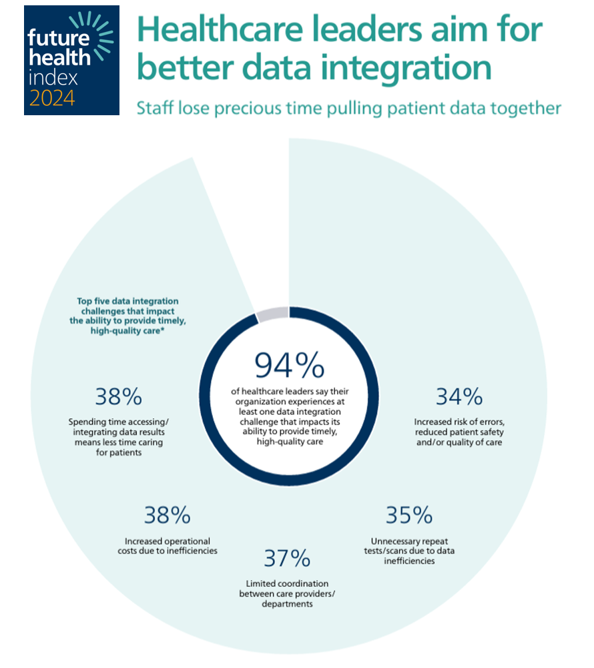The Future Of Healthcare: Analyzing The Philips Future Health Index 2025 And The Role Of AI

Table of Contents
Key Predictions from the Philips Future Health Index 2025
The Philips Future Health Index 2025 paints a picture of a healthcare system increasingly driven by data, technology, and a personalized approach to patient care. Several key trends emerge:
Increased Focus on Preventative Care and Personalized Medicine
The report emphasizes a significant shift towards proactive health management. Instead of solely reacting to illnesses, the focus is shifting to preventative care and personalized medicine. This involves leveraging data and predictive analytics to identify individuals at risk of developing specific conditions and implementing tailored interventions to prevent or mitigate their onset.
- Personalized medicine: Tailoring treatments and preventative strategies to individual genetic predispositions, lifestyle factors, and environmental influences.
- Predictive analytics: Using data-driven insights to predict potential health risks and proactively manage them.
- Remote patient monitoring: Utilizing wearable technology and remote sensors to continuously track vital signs and other health data, enabling early intervention.
The Philips report cites examples of successful implementations of these strategies, demonstrating a tangible shift towards a more proactive and individualized approach to healthcare. For example, the use of wearable sensors for monitoring heart conditions allows for early detection of irregularities and timely intervention, preventing serious complications.
The Rise of Digital Health Technologies and Telemedicine
The Philips Future Health Index 2025 highlights the accelerating adoption of digital health technologies and telemedicine. This includes remote patient monitoring, virtual consultations, and the increasing use of mobile health (mHealth) applications.
- Telehealth benefits: Increased access to care, especially in remote areas, reduced healthcare costs, and improved convenience for patients.
- Remote diagnostics: Utilizing digital tools for remote assessment of patient conditions, reducing the need for in-person visits.
- Challenges: Ensuring digital literacy among patients, addressing concerns about data security and privacy, and maintaining the quality of care delivered remotely.
The widespread adoption of telehealth and remote patient monitoring represents a significant step towards improving access to quality healthcare while streamlining operations and reducing costs. However, addressing the associated challenges is crucial for successful implementation.
Growing Importance of Data Analytics and AI in Healthcare
Big data is rapidly transforming healthcare. The Philips report underscores the growing importance of data analytics and AI in improving diagnostics, treatment, and patient outcomes.
- AI in diagnostics: AI-powered tools are being used to analyze medical images, detect anomalies, and assist in diagnosis with greater accuracy and speed.
- AI in drug discovery: AI algorithms are accelerating the drug discovery process by identifying potential drug candidates and predicting their efficacy.
- Personalized treatment plans: AI is helping to develop personalized treatment plans based on individual patient characteristics and genetic information.
The report showcases numerous examples of AI applications already making a significant impact, highlighting its potential to drastically improve healthcare efficiency and effectiveness. This includes faster and more accurate diagnosis of diseases like cancer and the development of tailored therapies with improved efficacy and reduced side effects.
The Transformative Role of AI in Shaping the Future of Healthcare
AI is not just a supporting technology; it's poised to fundamentally reshape the healthcare industry.
AI-Powered Diagnostics and Treatment
AI is significantly enhancing diagnostic accuracy and accelerating drug discovery.
- Medical image analysis: AI algorithms are proving highly effective in analyzing medical images (X-rays, CT scans, MRIs) to detect subtle anomalies that might be missed by the human eye, leading to earlier and more accurate diagnoses.
- AI drug discovery: AI is streamlining the traditionally lengthy and expensive drug development process by identifying promising drug candidates and predicting their effectiveness, reducing the time and cost associated with bringing new treatments to market.
- Personalized treatment: AI algorithms analyze patient data to identify optimal treatment strategies tailored to individual needs, improving treatment outcomes and reducing adverse effects.
AI and Automation in Healthcare Operations
AI-driven automation promises to revolutionize healthcare operations, increasing efficiency and reducing costs.
- Robotic Process Automation (RPA): Automating administrative tasks such as scheduling appointments, managing medical records, and processing insurance claims, freeing up healthcare professionals to focus on patient care.
- Improved efficiency: AI can optimize hospital workflows, reduce wait times, and improve resource allocation, leading to significant cost savings and enhanced patient satisfaction.
- Ethical considerations: While automation promises to boost efficiency, careful consideration of potential job displacement and the need for retraining healthcare professionals is crucial.
Addressing Ethical Concerns and Challenges in AI Healthcare
The implementation of AI in healthcare raises critical ethical considerations.
- Data privacy: Protecting sensitive patient data is paramount, requiring robust security measures and adherence to privacy regulations.
- Algorithmic bias: AI algorithms can inherit biases present in the data they are trained on, leading to potentially unfair or discriminatory outcomes. Mitigating bias through careful data selection and algorithm design is crucial.
- Transparency and explainability: Ensuring that AI-driven decisions are transparent and understandable is essential for building trust and accountability.
Addressing these ethical challenges through robust regulatory frameworks, ethical guidelines, and ongoing research is crucial for the responsible and equitable implementation of AI in healthcare.
Conclusion: The Future of Healthcare is Now – Embracing AI for Better Outcomes
The Philips Future Health Index 2025 clearly demonstrates the transformative potential of AI and digital health technologies in reshaping the future of healthcare. By embracing these innovations, we can improve preventative care, personalize treatment, enhance diagnostic accuracy, streamline operations, and ultimately achieve better patient outcomes. The key lies in responsible implementation, addressing ethical concerns, and fostering collaboration between healthcare professionals, technology developers, and policymakers. Learn more about the future of healthcare and the role of AI by exploring the latest advancements and the comprehensive insights provided in the Philips Future Health Index 2025. Discover how AI is revolutionizing healthcare and explore the possibilities of AI in the future of healthcare.

Featured Posts
-
 Mengupas Sejarah Porsche 356 Dari Zuffenhausen Ke Dunia
May 24, 2025
Mengupas Sejarah Porsche 356 Dari Zuffenhausen Ke Dunia
May 24, 2025 -
 Lewis Hamiltons Comments Criticized Ferraris Strong Response
May 24, 2025
Lewis Hamiltons Comments Criticized Ferraris Strong Response
May 24, 2025 -
 Nemecke Firmy A Masivne Prepustanie Analyza H Nonline Sk
May 24, 2025
Nemecke Firmy A Masivne Prepustanie Analyza H Nonline Sk
May 24, 2025 -
 2 Fall On Amsterdam Stock Exchange Impact Of Trumps Tariffs
May 24, 2025
2 Fall On Amsterdam Stock Exchange Impact Of Trumps Tariffs
May 24, 2025 -
 Jazda Probna Porsche Cayenne Gts Coupe Opinia Po Przejazdzce
May 24, 2025
Jazda Probna Porsche Cayenne Gts Coupe Opinia Po Przejazdzce
May 24, 2025
Latest Posts
-
 Farrows Plea Hold Trump Accountable For Venezuelan Gang Member Deportations
May 24, 2025
Farrows Plea Hold Trump Accountable For Venezuelan Gang Member Deportations
May 24, 2025 -
 Actress Mia Farrow Trump Should Face Charges For Venezuela Deportation Policy
May 24, 2025
Actress Mia Farrow Trump Should Face Charges For Venezuela Deportation Policy
May 24, 2025 -
 Farrow Seeks Trumps Imprisonment Following Venezuelan Deportation Controversy
May 24, 2025
Farrow Seeks Trumps Imprisonment Following Venezuelan Deportation Controversy
May 24, 2025 -
 Mia Farrows Plea Imprison Trump For Venezuelan Deportation Policy
May 24, 2025
Mia Farrows Plea Imprison Trump For Venezuelan Deportation Policy
May 24, 2025 -
 The Four Women Who Married Frank Sinatra Their Stories And Impact
May 24, 2025
The Four Women Who Married Frank Sinatra Their Stories And Impact
May 24, 2025
